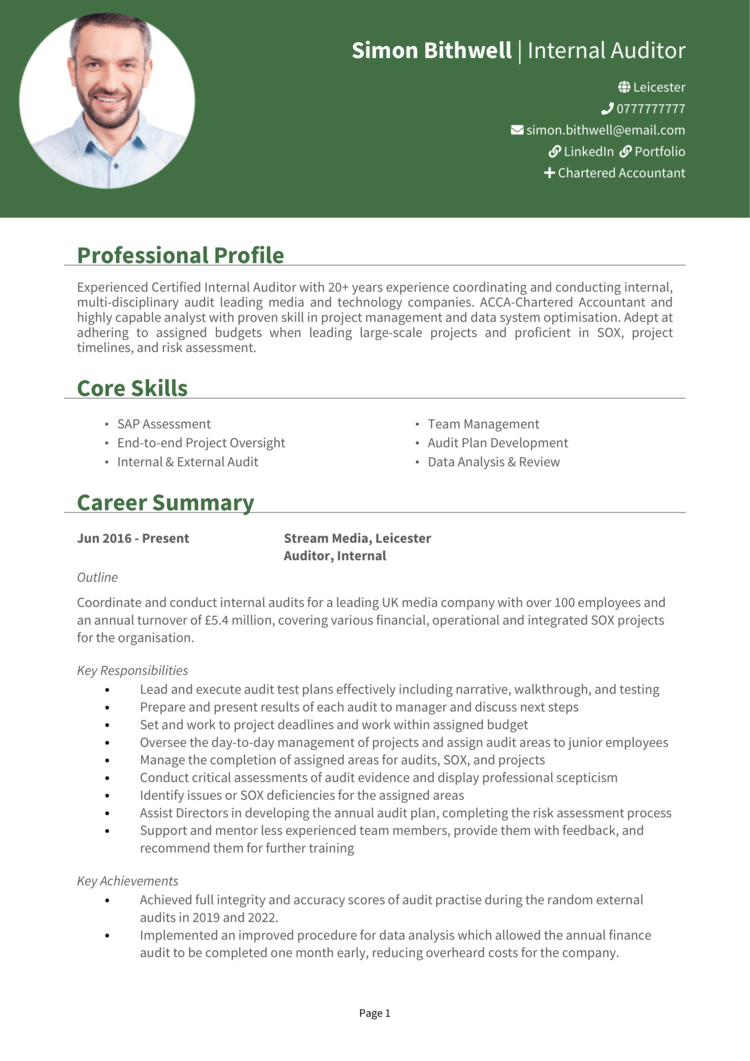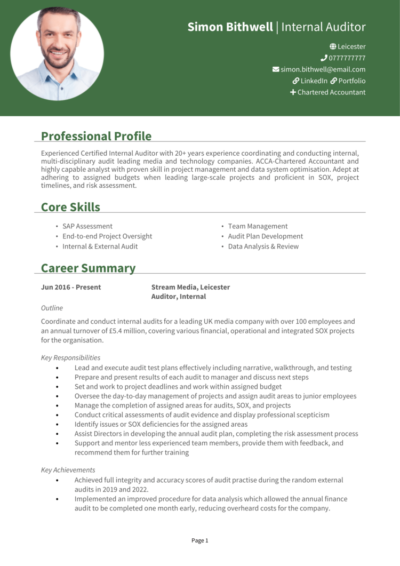Numbers don’t lie – but they don’t tell the full story unless someone digs into the detail. That’s where you come in. As an Internal Auditor, your CV should do the same thing you do best: present the facts clearly, uncover the most relevant details, and prove the value you bring.
This guide and its Internal Auditor CV example will show you how to create a CV that demonstrates your ability to safeguard compliance and efficiency within any organisation.
Internal Auditor CV sample

How to write your Internal Auditor CV
Discover how to craft a winning Internal Auditor CV that lands interviews with this simple step-by-step guide.
An effective audit uncovers risk and highlights improvements, and your CV should operate in much the same way. It’s not just about listing experience – it’s about showing recruiters how your work strengthens processes, ensures accountability, and supports smarter business decisions.
In the sections ahead, you’ll learn about writing a CV to highlight your experience with impact, and tailor your skills so employers immediately recognise you as a strong candidate.
How to structure and format your Internal Auditor CV


Your CV structure is a little like a good audit file – logical, accessible, and free of clutter. Recruiters want to be able to see your credentials, experience, and specialist skills at a glance without hunting for them in a wall of text. If they struggle to find what makes you so good, they’re not going to bother investigating – they’ll just move on to the next candidate.
Here’s the layout to follow:
- Name and contact details – Start with your name and personal details – make it simple for recruiters to reach you. Including a photo is a personal choice.
- Profile – Use this section to summarise your experience, strengths, and what makes you a standout candidate.
- Core skills – Outline your primary competencies to give recruiters a snapshot of your strengths.
- Work experience – Walk through your professional experience, beginning with your latest position and moving backwards.
- Education & certifications – Outline your education and certifications, focusing on those most relevant to the role.
- Additional info – This section is optional, but it’s a good place for interests and hobbies that complement your CV.
When it comes to your CV format, think clarity and professionalism. Use bullet points in each part to clear up dense text and keep everything readable. Keep section headings clear so the document is easy to navigate. Choose a simple, professional font, make sure the CV doesn’t exceed two pages in length, and allow enough white space so the reader can take in each section comfortably.
How to write an Internal Auditor CV profile


Your CV profile is the first opportunity to show how your expertise delivers real benefits to an employer. Rather than simply listing that you’ve conducted audits, focus on the outcomes – such as identifying inefficiencies and ensuring compliance. This summary should present you as someone who not only understands processes but actively strengthens them.
Internal Auditor CV profile examples
Profile 1
Experienced Internal Auditor with over 15 years in financial services and multinational corporations, specialising in risk management, compliance, and operational auditing. Skilled in planning and conducting audits, preparing detailed reports, and recommending process improvements. Proficient in SAP, ACL Analytics, and Microsoft Dynamics. Known for delivering actionable insights that strengthen governance and support regulatory compliance.
Profile 2
Analytical Internal Auditor with eight years of experience in manufacturing and FMCG industries, focusing on financial, operational, and IT audits. Adept at identifying control weaknesses, testing compliance, and ensuring adherence to ISO and SOX requirements. Experienced in data analysis and reporting using IDEA and Power BI. Recognised for accuracy, efficiency, and strong communication with senior stakeholders.
Profile 3
Motivated Internal Auditor with three years of experience working for a regional consultancy, assisting clients across healthcare and education sectors. Conducted audit fieldwork, reviewed internal processes, and documented findings for senior auditors. Comfortable using TeamMate+ and Excel to analyse data and prepare reports. Passionate about developing expertise in governance and compliance while building strong client relationships.
Details to put in your Internal Auditor CV profile
Here’s what to include:
- Where you worked – Mention the types of organisations you’ve supported, whether that’s public sector bodies, financial services, or corporate environments.
- Your top qualifications – Note any degrees, diplomas, or auditing certifications that back up your professional authority.
- Essential skills – Summarise the core competencies you use in your role, aligning them with the demands of the vacancy.
- Specialist areas or focus – Highlight whether you’ve specialised in areas such as financial audits, compliance, risk management, or IT systems.
- Value delivered – Explain how your work has strengthened governance, saved money, or improved efficiency.
What to include in the core skills section of your CV


Recruiters will often scan this section before anything else, so it should clearly highlight your most relevant capabilities. Focus on hard, demonstrable CV skills that connect directly to the job description, not generic personal traits.
Think of it as a shortlist of what you bring to the table – and tailor it for every role you apply to. The closer it matches the employer’s requirements, the more likely it is they’ll shortlist you.
Best skills for your Internal Auditor CV
- Risk Assessment and Control Evaluation – Identifying and analysing business risks and assessing the effectiveness of internal controls.
- Audit Planning and Execution – Developing audit plans, conducting fieldwork, and documenting findings in accordance with auditing standards.
- Financial and Operational Audit Reviews – Examining financial records and operational processes to ensure accuracy, efficiency, and compliance.
- Regulatory Compliance Testing – Verifying adherence to laws, regulations, and internal policies across departments.
- Data Analysis and Sampling Techniques – Using analytical tools and methods to detect irregularities and support audit conclusions.
- Internal Control Framework Knowledge – Applying frameworks such as COSO to evaluate organisational governance and risk management.
- Report Writing and Recommendation Development – Preparing clear audit reports and suggesting practical, risk-based improvements.
- Follow-Up and Action Tracking – Monitoring the implementation of audit recommendations and reporting on progress to stakeholders.
- Stakeholder Communication and Interviewing – Engaging with staff at all levels to gather information and communicate audit findings.
- Fraud Detection and Prevention Support – Identifying signs of fraud and assisting in the investigation and prevention of unethical activities.
How to write a strong work experience section for your CV


This section shows how you’ve applied your knowledge to improve processes, reduce risks, and support compliance in practice. Employers want to see results, so don’t just list duties – make clear the impact of your work.
Lay out your roles in reverse chronological order, beginning with your most recent. For each role, provide a brief overview of the employer and your position, then use bullet points to detail responsibilities and achievements. If you’re earlier in your career, include internships or trainee auditor positions to build credibility – these absolutely count towards work experience.
The best way to structure job entries on your CV

- Outline – Introduce the organisation, the role you held, and the main objective of your position, including who you reported to.
- Responsibilities – Describe your duties using action words like “evaluated” and “implemented.” For example: “evaluated financial reporting processes” or “implemented compliance checks across business units.”
- Achievements – Demonstrate the measurable benefits of your work, such as identifying cost savings, improving compliance scores, or ensuring audit readiness for external regulators.
Sample jobs for Internal Auditors
Internal Auditor | Bracknell Financial Group
Outline
Conducted internal audits for a global investment firm, focusing on financial controls, compliance with regulations, and operational efficiency across multiple business units.
Responsibilities
- Planned and executed audits in line with annual audit schedule
- Reviewed internal controls to assess risk management effectiveness
- Analysed financial data and prepared detailed working papers
- Presented audit findings and recommendations to senior management
- Followed up on remediation actions to ensure compliance with deadlines
Achievements
- Identified control weaknesses that reduced financial risk exposure by £10m
- Helped improve audit cycle efficiency by 25% with data-driven testing methods
- Contributed to achieving full compliance in a regulatory inspection
Internal Auditor | Wexford Manufacturing Plc
Outline
Provided audit support for a multinational manufacturing company, assessing financial controls, supply chain processes, and IT systems across multiple plants and offices.
Responsibilities
- Reviewed procurement and supply chain processes for efficiency and compliance
- Conducted inventory audits and reconciled discrepancies with production teams
- Tested IT system controls to ensure compliance with SOX requirements
- Drafted clear and concise audit reports for senior management review
- Worked closely with external auditors during statutory audits
Achievements
- Reduced stock discrepancies by 18% through improved inventory controls
- Supported introduction of a new ERP system by testing key internal controls
- Recognised by senior leadership for thorough and actionable audit reporting
Internal Auditor | Elmswood Consulting Services
Outline
Worked within a consultancy delivering audit services for clients in healthcare, education, and local government. Supported senior auditors by conducting fieldwork and preparing documentation for client reports.
Responsibilities
- Carried out process walkthroughs and documented control environments
- Performed testing of transactions to identify control gaps
- Assisted in drafting risk assessments and audit plans
- Prepared working papers and maintained audit evidence in TeamMate+
- Communicated findings to clients and supported remediation planning
Achievements
- Contributed to successful delivery of 15 client audits within agreed timescales
- Helped improve client compliance scores by up to 20% through targeted recommendations
- Commended for clear and professional client communication during audit fieldwork
How to list your educational history


Your education reinforces your credibility as an auditor and shows you’ve built a strong foundation of knowledge. Include your degree and any relevant postgraduate training or certifications that apply directly to internal auditing.
List your qualifications in reverse chronological order, starting with the most recent. If you’ve undertaken specialist training such as IT audit courses, risk management, or financial compliance, include these to demonstrate ongoing professional development.
What are the best qualifications for an Internal Auditor CV?
- Chartered Institute of Internal Auditors (CIA) Qualification – The industry standard for internal audit professionals.
- Association of Chartered Certified Accountants (ACCA) – Provides accounting knowledge that strengthens audit expertise.
- Chartered Accountant (ACA) Qualification – A prestigious credential with strong relevance to financial and corporate audits.
- CIMA Certificate in Business Accounting – Builds understanding of management accounting and business processes.
- ISO 9001 Lead Auditor Training – Demonstrates ability to audit against international quality standards.





